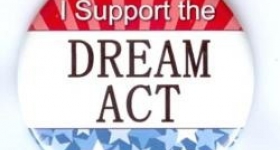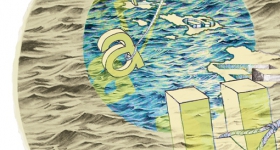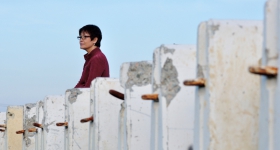Two possible foreign radicals. (Photo Credit: Muslim Girls by Shazron, cc by 2.0)
On March 10, the House Committee on Homeland Security, chaired by Rep. Peter King (R-NY), held the first in a series of hearings on “The Extent of Radicalization in the American Muslim Community and that Community’s Response.” Its purpose was to investigate whether American Muslims, including around one million Asian Americans, were at fault for not doing enough to foil domestic terrorist attacks.
There were protests before the hearings began. Some groups wondered why, instead of investigating terrorist organizations, King was investigating five to seven million Americans on the basis of their religious affiliation.
"The Department of Homeland Security and this committee were formed in response to the al-Qaeda attacks of 9/11," King said in his opening statements. "There is no equivalency of threat between al-Qaeda and neo-Nazis, environmental extremists, or other isolated madmen."
But why view all Muslims as a pool of potential al-Qaeda sympathizers, and why dismiss documented non-Muslim extremist groups as being unworthy of investigation? Even if King discounts the findings of the Southern Poverty Law Center's Intelligence Project, there are still the findings of the Department of Homeland Security, which released a report in 2009 titled "Right-Wing Extremism: Current Economic and Political Climate Fueling Resurgence in Radicalization and Recruitment".
Before the House Committee hearings began, The American Civil Liberties Union was among the groups which argued that American Muslims should not be assigned guilt by association. King, the ACLU said, was "wrongly conflating First Amendment-protected religious beliefs and practices with involvement in terrorism".
"There is nothing radical or un-American in holding these hearings,” King said in response. “Indeed, Congressional investigation of Muslim American radicalization is the logical response to the repeated and urgent warnings which the Obama administration has been making in recent months.”
This statement, however, doesn't address the actual criticism. Why is it a logical response to hold all Muslim Americans to account, for repeated and urgent warnings made against Muslim extremist groups? Is it the logic by which left-handed people should be scrutinized for potentially aiding and abetting the left-handed Boston Strangler? Is it the logic by which a teen dragged to Sunday mass should be suspected of harboring a secret desire to burn crosses?
Or is it the logic that so many Americans seem to subscribe to, that there is something inherent in Islam that makes Muslims more likely to be violent extremists?
In 2004, King said, in an interview with Sean Hannity, that "80% to 85% of mosques in this country are controlled by Islamic fundamentalists. I'll stand by that number of 85%." In 2007, he repeated the same sentiments, claiming that there were too many mosques in this country, and that they were threats which must be infiltrated.
As Saleh Sbenaty, a Muslim American, said in a CBS interview, "If the mosque itself, the place of worship, is labeled as radical, then if I go there, I'm going to be radical as well." [1]
In the press conference after the hearings, King said, "those who are most victimized, by the radicalization of the Muslim American community, by al-Qaeda, are the Muslim Americans themselves. Especially in view of the lack of support they receive from the people in their community, who should be the leaders."
His vocal white-knighting of a victimized Muslim American community, against not just al-Qaeda, but also its leaders and its own radicalized self, seemed both suspect and familiar. [2]
There are Muslim American leaders, such Imam Feisal Abdul Rauf, who work with American law enforcement. Imam Rauf has repeatedly stated that "Islamic extremism for the majority of Muslims is an oxymoron. It is a fundamental contradiction in terms." His words echo those of other Muslim Americans who have denounced terrorists. How can such Muslim leaders be held responsible for the radicalization of the Muslim American community? And what new breed of suspected religious radicals are Muslim Americans, with their documented hostility to jihadist ideology, cooperation with law enforcement, and insistence that terrorism is a distortion of Islam?
During the hearings, and in press conferences afterwards, King repeatedly brushed off the ACLU and most other critics as spreading "mindless hysteria". [3] One can safely assume that the irony of the situation was lost on him.
So perhaps the most pertinent question, now, isn't "The Extent of Radicalization in the American Muslim Community and that Community’s Response”, but rather: Are these hearings a modern day witch hunt? Are they a red scare? (There seems to be a troubling division in the ranks of Washington Post on this issue...)
And why, considering the perpetual foreigner syndrome that also faces Muslim Americans, is no one positing that they might be a Muslim peril?
It is tempting to laugh at the absurdity of this. But 9/11 caused an unprecedented increase of discrimination and hate crimes, especially in Arab American and South Asian American communities. Since then, discrimination against Muslim Americans has become increasingly institutionalized. Local governments prevent Muslim Americans from building mosques and community centers, and the FBI and other law enforcement profile and target their communities, allegedly manufacturing a "Muslim menace". And perhaps most troubling, the US government stands accused of committing human rights violations, by the UN as well as American civil rights groups.
And yet King still believes that it is American Muslims who have difficulties reconciling the different parts of their identity. He said, in a press conference after the hearings, "I think we broke down a wall of political correctness, on an issue which has to be addressed."
And the Americans who would beg to differ are mostly radicals or politically correct hysterics.
----------------------------
[1] Though it must be stated: King never claimed that all mosques were radical. There were 15% of mosques, and therefore mosque-going Muslims, that he allowed the possibility of not being radical.
[2] In 2004, King told Sean Hannity that "no American Muslim leaders are cooperating in the war on terror".
[3] King in his opening statement: "Some of this opposition -- such as from my colleague and friend Mr. Ellison has been measured and thoughtful. Other opposition -- both from special interest groups and the media has ranged from disbelief to paroxysms of rage and hysteria."










Comments